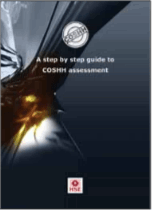|
|
Hazardous Substances p2Send comments on this topic |
FREE QHSE Software Click <HERE> to Learn More |
||
QHSE Support >(Site Map) Health & Safety Guidance > Hazardous Substances >
Hazardous Substances guidance page 2 of 3
Examples of the effects of hazardous substances include:
•skin irritation or dermatitis as a result of skin contact,
•asthma as a result of developing an allergy to substances used at work,
•losing consciousness as a result of being overcome by toxic fumes,
•cancer, which may appear long after the exposure to the chemical that caused it, and
•infection from bacteria and other micro-organisms (biological agents).
A COSHH material safety data sheet often referred to as an MSDS sheet, should be supplied with any hazardous substance at its delivery location. MSDS sheets should always be available to all members of staff and others who may require to handle, move or use the hazardous substance, etc.
The MSDS contains guidelines on what is needed if the hazardous substance accidentally comes into contact with your skin, eyes, is ingested orally or is possibly absorbed through the skin. It will also include other safety precautions, such as what to do about spillages or leaks. Warning labels classify the types of hazards, such as irritant, flammable, very flammable, toxic, very toxic, corrosive, explosive, sensitising, dangerous to the environment, etc.
The COSHH (hazardous substances controls) Regulations apply to virtually all substances hazardous to health. Exceptions include asbestos and lead, which have their own regulations, and also substances that are hazardous only because they are radioactive or asphyxiate.
COSHH (hazardous substances controls) requires the following.
•assessment of the risks. (COSHH risk assessment)
•deciding what precautions are needed.
•prevention or control of the risks.
•ensuring that control measures are used and maintained.
•monitoring exposure and health surveillance, where necessary, and,
•informing instructing and training employees about the risks and precautions needed.
Further on the control of substances can be found in ACOP L5 and HSG 97 A step by step guide to COSHH assessment
Related Links
•The new international hazard symbols and warning
•Dangerous for the Environment
•Table of New GHS Hazard Symbols
•Substances Risk Assessment p1 of 5
•Substances Risk Assessment p2 of 5
•Substances Risk Assessment p3 of 5
•Substances Risk Assessment p4 of 5
•Substances Risk Assessment p5 of 5
Help file v2.276.407 : QHSE Support - Website On Safe Lines
onsafelines.com QHSE Software 2025 : Webmaster: Brian G. Welch MSc(QHSE), NVQ4(OH&S), CMIOSH




